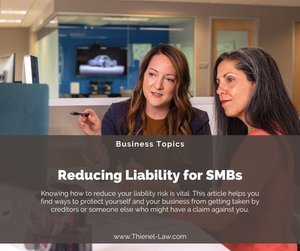Small Business Bookkeeping Tips from a Maryland Business Tax Attorney
You took a chance and pursued your dream of owning your own business, but you now find yourself drowning in paperwork. It would help if you could learn how to manage the financial side of your business so you can get back to providing the goods or services that are the backbone of your company.
Here are the top 10 small business bookkeeping tips from a Columbia, Maryland tax attorney:
Tip #1: Set up a separate bank account for your business.
At first, it's tempting to run your business out of your personal bank account but doing so can cause huge problems for you later and create many hours of extra work for you. Small business owners can prevent questions of the co-mingling of funds and have the information you need for tax preparation and business planning in one account if you have dedicated business accounts. The Small Business Administration (SBA) recommends both a business checking account and a business savings account.
Tip #2: Select an Accounting Method and Stick to It
As the SBA explains, the accrual method lets you see your overall financial picture with a glance at the balance sheet and possibly pay less in taxes, but accrual method accounting can be challenging to manage and can create a skewed image of the actual health of your business. Cash method accounting can help you understand your actual cash flow, but it provides little insight on trends and other long-term planning issues.
Tip #3: Be Compulsive About Memorializing Your Expenses
It is easy to tell yourself that you will file that receipt later, but that mindset can lead to misplaced documentation that could have saved you money on your taxes. Find whatever system works for you, whether it is an app on your phone, a physical file folder, or accounting software, and use it without fail. Think of every expense you do not record as cash taken out of your wallet.
Tip #4: Automate Your Books
Minimize the time you must spend updating the books by automating them now. There are software programs that synchronize your bank accounts and create reports with the click of a button.
Tip #5: Hire a Professional Bookkeeper
It will be well worth the investment of money to hire a small business accountant or professional bookkeeper to set up your record-keeping systems properly. Starting on the right foot is an essential factor in the success of individuals and small businesses. Once you feel comfortable, you might handle the day-to-day bookkeeping services on your own and need only a quarterly or annual check-in and tax services with your accounting firm. Just remember that the time you spend doing your own bookkeeping and tax preparation takes away from the time you can spend making money with your business.
Tip #6: Record All Income in Real-Time
As with expenses, it is easy to forget to keep track of income if you do not put it in the books immediately. Some accounting and bookkeeping software programs can make this process easy, even automatic, after you create rules in the software program for handling specific situations. Check out our video for more tips on making tax time easier.
Tip #7: Schedule Time to Update Your Books
Depending on the nature of your business, spend a couple of hours every week or a full day every month bringing your financial records up to date. While this might sound like an inconvenience, when year-end taxes roll around and it is time to prepare the company tax returns, you will be grateful that you took care of your books in small bites throughout the year.
Tip #8: Plan for Upcoming Expenses
Your equipment will not last forever. Repairs are an ongoing reality. Good business planning requires budgeting money for costs ahead of time, rather than running into a cash crunch every time you have a minor setback.
Tip #9: Analyze How Much It Costs You to Make Money
Explore how much you spend on labor, inventory, office supplies, credit cards, loans, and other line items that go into the delivery of goods or services.
Tip #10: Constantly Update Your Business Projections
You created a business plan before launching your company, but the planning work does not stop there. Many people get so busy doing the work and wearing the many hats necessary to run a small business they forget to keep looking down the road. Review your income statement and other financial reports. Analyze trends in your company and your industry and be prepared to adjust as needed. Failure to forecast where your business might go in the future can result in lost financial opportunities. Make sure that tax planning is part of this process.
Work with a Columbia, Maryland Business Tax Attorney
You do not have to accomplish these steps on your own. A Maryland business tax attorney can provide valuable guidance and business services for your company to help it avoid perils and stay profitable. This article is for informational purposes only and does not constitute legal or tax advice.
Related




